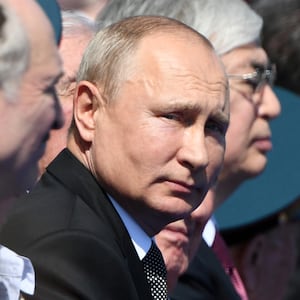MOSCOW—All of Yekaterina Mazalova’s friends tried to talk her out of joining a clinical trial for Sputnik V, the Russian coronavirus vaccine. “Don’t become a rabbit for experiments,” her best friend told her.
Over the summer, Russia claimed to be the first country in the world to approve a vaccine, before trials had even begun. As assurance, President Vladimir Putin said his daughter took the shot. But the early missteps on the vaccine’s announcement and rollout only added to what is now a looming problem: 45 percent of Russians are skeptical of Sputnik V.
The public fear over the vaccine falls into several categories, experts say. Some see it as poorly researched and succumb to conspiracy theories. “Many don’t believe that authorities publish all the data or tell people the entire truth,” Alexander Ivanov, a research associate at Moscow’s Institute of Molecular Biology, said of the low public trust in an interview with The Daily Beast. “There are blank spots and questions for the research—but considering the spreading pandemic, 1.6 million victims, it makes sense to go forward with the mass vaccination, as soon as possible.”
Mazalova did not listen to her doubtful friends and took a risk. She flew to Moscow to get her first shot in mid-October, as a volunteer in the trials. “On the first night after the shot my temperature came up to 38.1 (100 degrees Fahrenheit) and after the second shot almost a month later, I felt pain in my arm for a couple of days,” Mazalova told The Daily Beast on Wednesday. “I stayed away from alcohol for a month, continued to wear a mask, distance myself in public places,” she said. A month after the shot, tests showed she had antibodies. “I am very happy I took part in the experiment, I am immune to COVID-19 now.”
Sputnik V is available to Russian teachers, doctors, social workers and shop assistants as the frontline workers most exposed to the virus. Hundreds of thousands of doses of Sputnik V are being distributed around the country. It costs $20 for foreigners, while citizens can get jabbed for free. Putin said last week that he had not had the vaccine yet but will take it when it’s approved for people over 65.
Nearly three million Russians have been diagnosed with COVID-19 since the beginning of the pandemic. More than 47,000 people have died, according to the official data. Many Russian regions increasingly suffer from critical shortages of ventilators, oxygen and medicine supplies. St. Petersburg, Russia’s second-largest city of 4.9 million, is currently experiencing the worst outbreak in the country; on Tuesday, there were only 27 open hospital beds left in the entire city for COVID-19 patients. During the month of December, the city has diagnosed nearly 4,000 new cases a day.
Varvara Pakhomenko flew from Canada to her Siberian hometown of Tomsk as soon as she heard that both her mother and her stepfather were sick, and coughing. By early November hospitals did not admit patients in the city of about half a million inhabitants, so Pakhomenko, who had no medical education, turned her mother’s apartment into a ward for intensive care and even managed to find an oxygen machine to help her patients breathe at home. “I had no idea that the situation would turn to be so hellish: pharmacies had no paracetamol, no antibiotics, no vitamins, doctors would not show up for visits, hospitals had no spot to admit my family members, even when they were in a severe condition,” Parkhomenko told The Daily Beast. (Her parents have since almost recovered.)
Hospital space is running out. In Nizhny Novgorod, east of Moscow, authorities turned 34 clinics into COVID-19 wards. By early November, 89 percent of beds for infected patients were occupied. In many cases, patients had to wait for ambulances for an hour or longer. A young private doctor, Andrey Monakhov, has visited at home over 1,000 patients with coronavirus in the past few months. “The question is not whether you should or should not take the vaccine but rather whether it is going to help or not—I would say go and take it,” Monakhov told The Daily Beast.
There are 70 clinics providing Sputnik V around Moscow. Authorities advise people to follow the quarantine rules, stay away from alcohol and be serious about supporting their immune systems during the 42 days after vaccination.
A 67-year-old historian, Olga Fedorava, decided to risk it, simply because she could not live without seeing her students—as soon as the teacher had a chance, she took Sputnik V. “My nose was running after the first shot and I had a bit of fever after the second shot and a week later the test showed I had both antibodies and T-cell immunity,” Fedorova told The Daily Beast. “I still wear my mask in public places but I can now meet with my young students without much concern, which is important for my work.”
Ivanov’s laboratory has been conducting tests for antibodies since April in search for donors of convalescent plasma for treatment of severe COVID-19 cases. It collaborated in studies of antibody-level persistence. “In the beginning of the pandemic we learned which medicine to use to treat severe symptoms of COVID-19, but now it is difficult to find these drugs in Moscow and especially in the regions,” she said. “That is the reason why I would recommend to have Sputnik V, especially to people with potential risks.”






